University Report: Complex Mental Health and Lived Experience in Care
VerifiedAdded on 2023/06/05
|8
|2298
|98
Report
AI Summary
This report delves into the crucial role of individuals with lived experience of mental health disorders in providing person-centred care and promoting strength-based recovery approaches. It emphasizes how their insights and experiences can significantly enhance the quality of care for those with mental health conditions. The assignment outlines specific strategies for integrating these individuals into mental health services, highlighting their ability to build relationships, reduce stigma, and offer valuable perspectives to both professionals and consumers. Furthermore, the report reflects on the development of the author's own nursing practice, focusing on effective communication and active listening techniques to foster collaborative relationships with individuals with lived experience. The conclusion underscores the importance of understanding lived experiences to create more effective and empathetic mental health care plans, ultimately supporting individuals in their journey towards recovery and social integration.
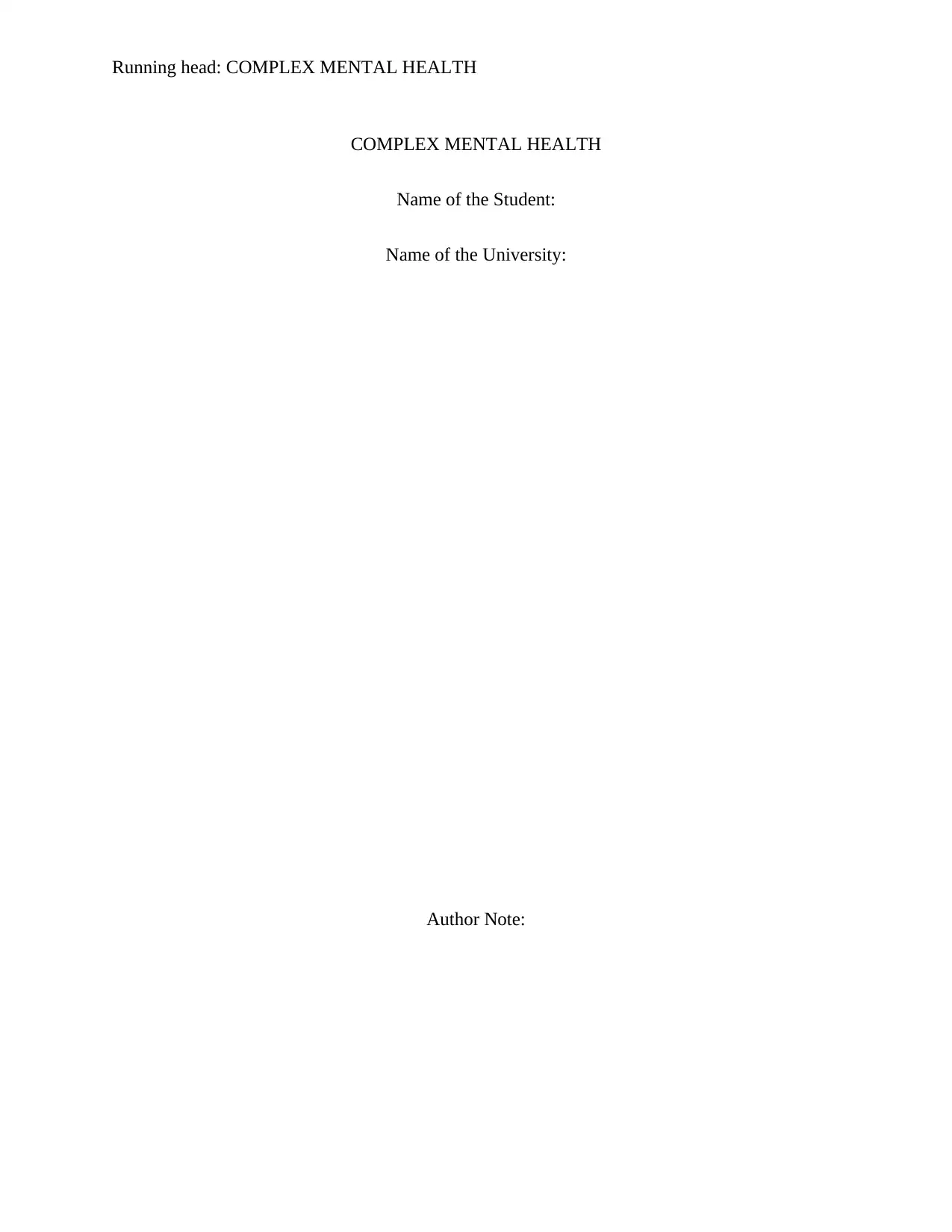
Running head: COMPLEX MENTAL HEALTH
COMPLEX MENTAL HEALTH
Name of the Student:
Name of the University:
Author Note:
COMPLEX MENTAL HEALTH
Name of the Student:
Name of the University:
Author Note:
Paraphrase This Document
Need a fresh take? Get an instant paraphrase of this document with our AI Paraphraser
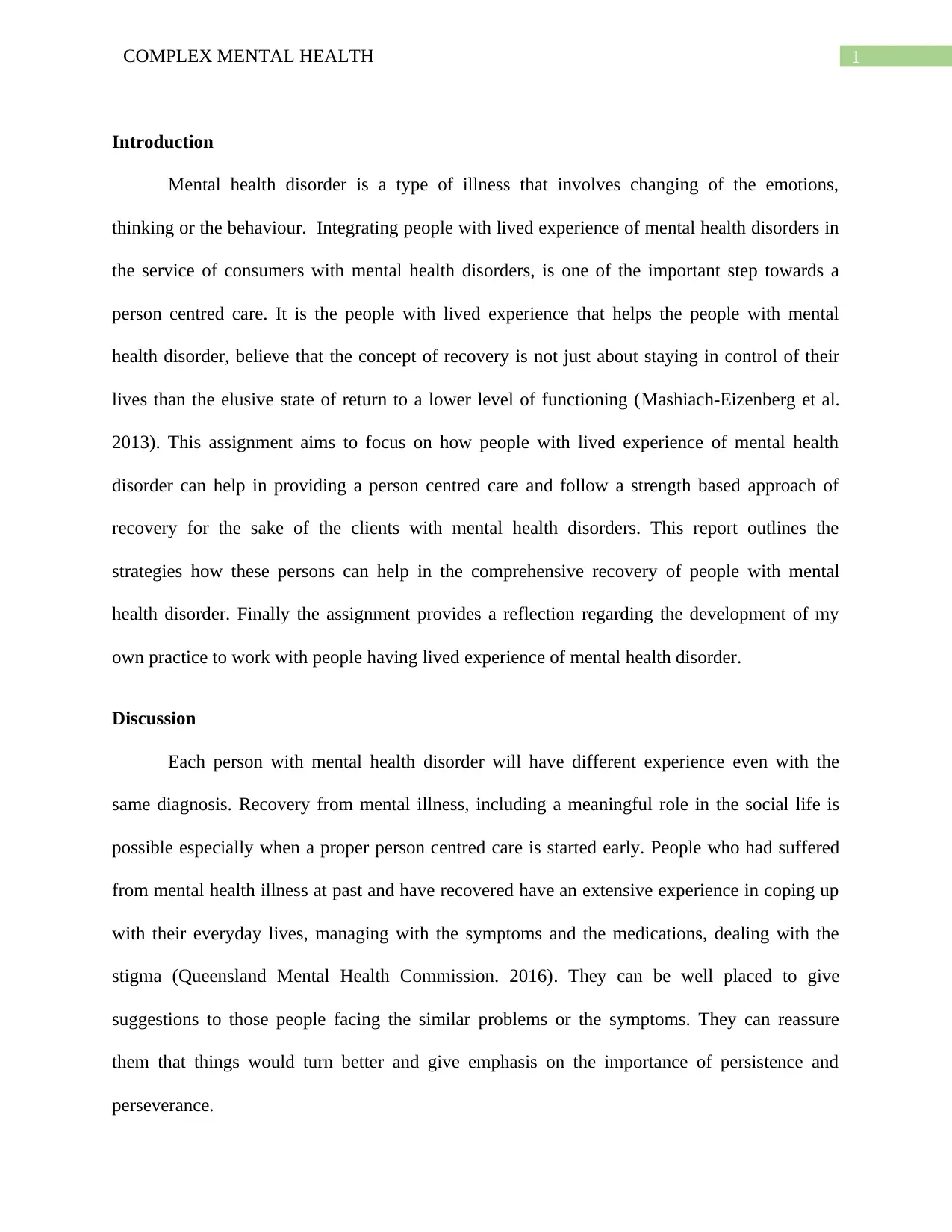
1COMPLEX MENTAL HEALTH
Introduction
Mental health disorder is a type of illness that involves changing of the emotions,
thinking or the behaviour. Integrating people with lived experience of mental health disorders in
the service of consumers with mental health disorders, is one of the important step towards a
person centred care. It is the people with lived experience that helps the people with mental
health disorder, believe that the concept of recovery is not just about staying in control of their
lives than the elusive state of return to a lower level of functioning (Mashiach-Eizenberg et al.
2013). This assignment aims to focus on how people with lived experience of mental health
disorder can help in providing a person centred care and follow a strength based approach of
recovery for the sake of the clients with mental health disorders. This report outlines the
strategies how these persons can help in the comprehensive recovery of people with mental
health disorder. Finally the assignment provides a reflection regarding the development of my
own practice to work with people having lived experience of mental health disorder.
Discussion
Each person with mental health disorder will have different experience even with the
same diagnosis. Recovery from mental illness, including a meaningful role in the social life is
possible especially when a proper person centred care is started early. People who had suffered
from mental health illness at past and have recovered have an extensive experience in coping up
with their everyday lives, managing with the symptoms and the medications, dealing with the
stigma (Queensland Mental Health Commission. 2016). They can be well placed to give
suggestions to those people facing the similar problems or the symptoms. They can reassure
them that things would turn better and give emphasis on the importance of persistence and
perseverance.
Introduction
Mental health disorder is a type of illness that involves changing of the emotions,
thinking or the behaviour. Integrating people with lived experience of mental health disorders in
the service of consumers with mental health disorders, is one of the important step towards a
person centred care. It is the people with lived experience that helps the people with mental
health disorder, believe that the concept of recovery is not just about staying in control of their
lives than the elusive state of return to a lower level of functioning (Mashiach-Eizenberg et al.
2013). This assignment aims to focus on how people with lived experience of mental health
disorder can help in providing a person centred care and follow a strength based approach of
recovery for the sake of the clients with mental health disorders. This report outlines the
strategies how these persons can help in the comprehensive recovery of people with mental
health disorder. Finally the assignment provides a reflection regarding the development of my
own practice to work with people having lived experience of mental health disorder.
Discussion
Each person with mental health disorder will have different experience even with the
same diagnosis. Recovery from mental illness, including a meaningful role in the social life is
possible especially when a proper person centred care is started early. People who had suffered
from mental health illness at past and have recovered have an extensive experience in coping up
with their everyday lives, managing with the symptoms and the medications, dealing with the
stigma (Queensland Mental Health Commission. 2016). They can be well placed to give
suggestions to those people facing the similar problems or the symptoms. They can reassure
them that things would turn better and give emphasis on the importance of persistence and
perseverance.
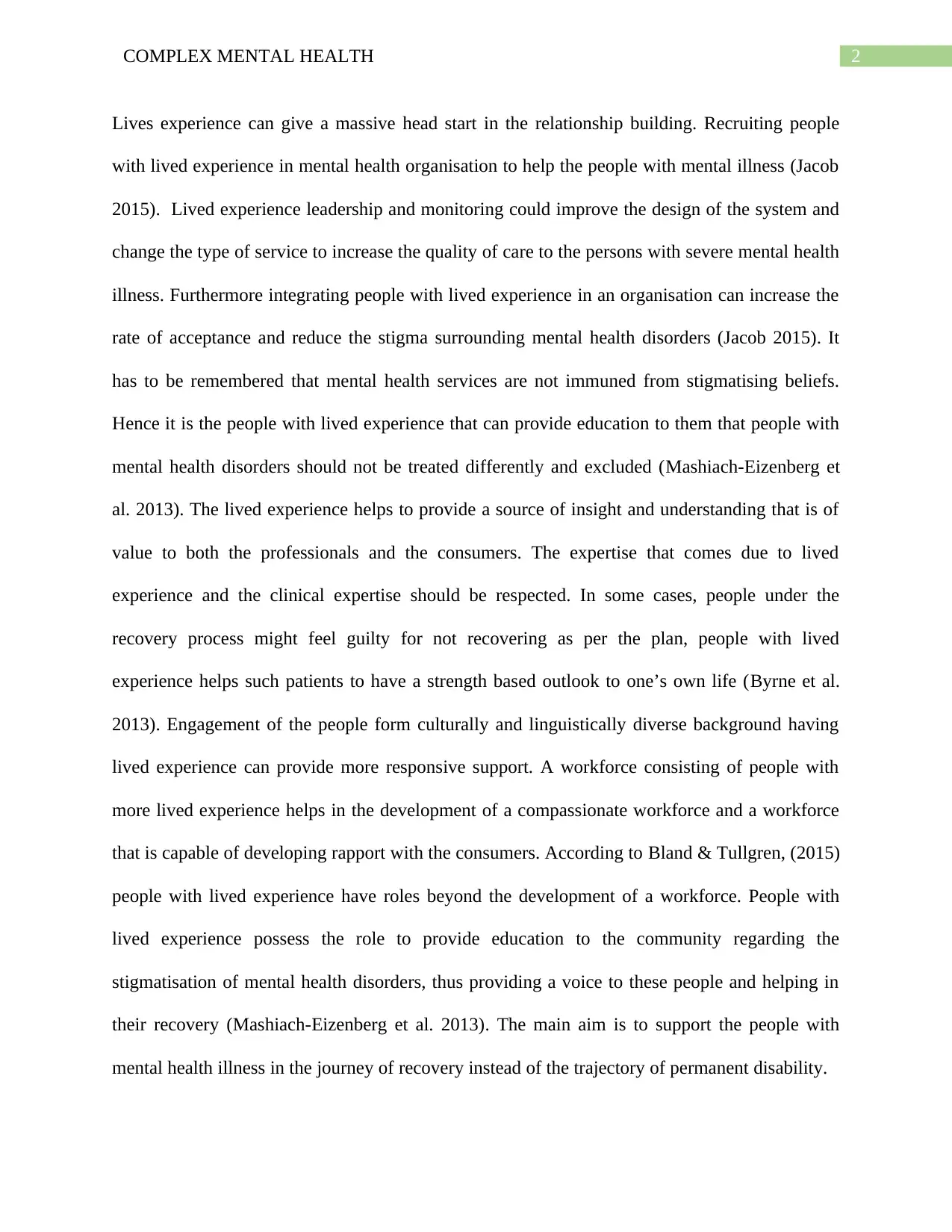
2COMPLEX MENTAL HEALTH
Lives experience can give a massive head start in the relationship building. Recruiting people
with lived experience in mental health organisation to help the people with mental illness (Jacob
2015). Lived experience leadership and monitoring could improve the design of the system and
change the type of service to increase the quality of care to the persons with severe mental health
illness. Furthermore integrating people with lived experience in an organisation can increase the
rate of acceptance and reduce the stigma surrounding mental health disorders (Jacob 2015). It
has to be remembered that mental health services are not immuned from stigmatising beliefs.
Hence it is the people with lived experience that can provide education to them that people with
mental health disorders should not be treated differently and excluded (Mashiach-Eizenberg et
al. 2013). The lived experience helps to provide a source of insight and understanding that is of
value to both the professionals and the consumers. The expertise that comes due to lived
experience and the clinical expertise should be respected. In some cases, people under the
recovery process might feel guilty for not recovering as per the plan, people with lived
experience helps such patients to have a strength based outlook to one’s own life (Byrne et al.
2013). Engagement of the people form culturally and linguistically diverse background having
lived experience can provide more responsive support. A workforce consisting of people with
more lived experience helps in the development of a compassionate workforce and a workforce
that is capable of developing rapport with the consumers. According to Bland & Tullgren, (2015)
people with lived experience have roles beyond the development of a workforce. People with
lived experience possess the role to provide education to the community regarding the
stigmatisation of mental health disorders, thus providing a voice to these people and helping in
their recovery (Mashiach-Eizenberg et al. 2013). The main aim is to support the people with
mental health illness in the journey of recovery instead of the trajectory of permanent disability.
Lives experience can give a massive head start in the relationship building. Recruiting people
with lived experience in mental health organisation to help the people with mental illness (Jacob
2015). Lived experience leadership and monitoring could improve the design of the system and
change the type of service to increase the quality of care to the persons with severe mental health
illness. Furthermore integrating people with lived experience in an organisation can increase the
rate of acceptance and reduce the stigma surrounding mental health disorders (Jacob 2015). It
has to be remembered that mental health services are not immuned from stigmatising beliefs.
Hence it is the people with lived experience that can provide education to them that people with
mental health disorders should not be treated differently and excluded (Mashiach-Eizenberg et
al. 2013). The lived experience helps to provide a source of insight and understanding that is of
value to both the professionals and the consumers. The expertise that comes due to lived
experience and the clinical expertise should be respected. In some cases, people under the
recovery process might feel guilty for not recovering as per the plan, people with lived
experience helps such patients to have a strength based outlook to one’s own life (Byrne et al.
2013). Engagement of the people form culturally and linguistically diverse background having
lived experience can provide more responsive support. A workforce consisting of people with
more lived experience helps in the development of a compassionate workforce and a workforce
that is capable of developing rapport with the consumers. According to Bland & Tullgren, (2015)
people with lived experience have roles beyond the development of a workforce. People with
lived experience possess the role to provide education to the community regarding the
stigmatisation of mental health disorders, thus providing a voice to these people and helping in
their recovery (Mashiach-Eizenberg et al. 2013). The main aim is to support the people with
mental health illness in the journey of recovery instead of the trajectory of permanent disability.
⊘ This is a preview!⊘
Do you want full access?
Subscribe today to unlock all pages.

Trusted by 1+ million students worldwide
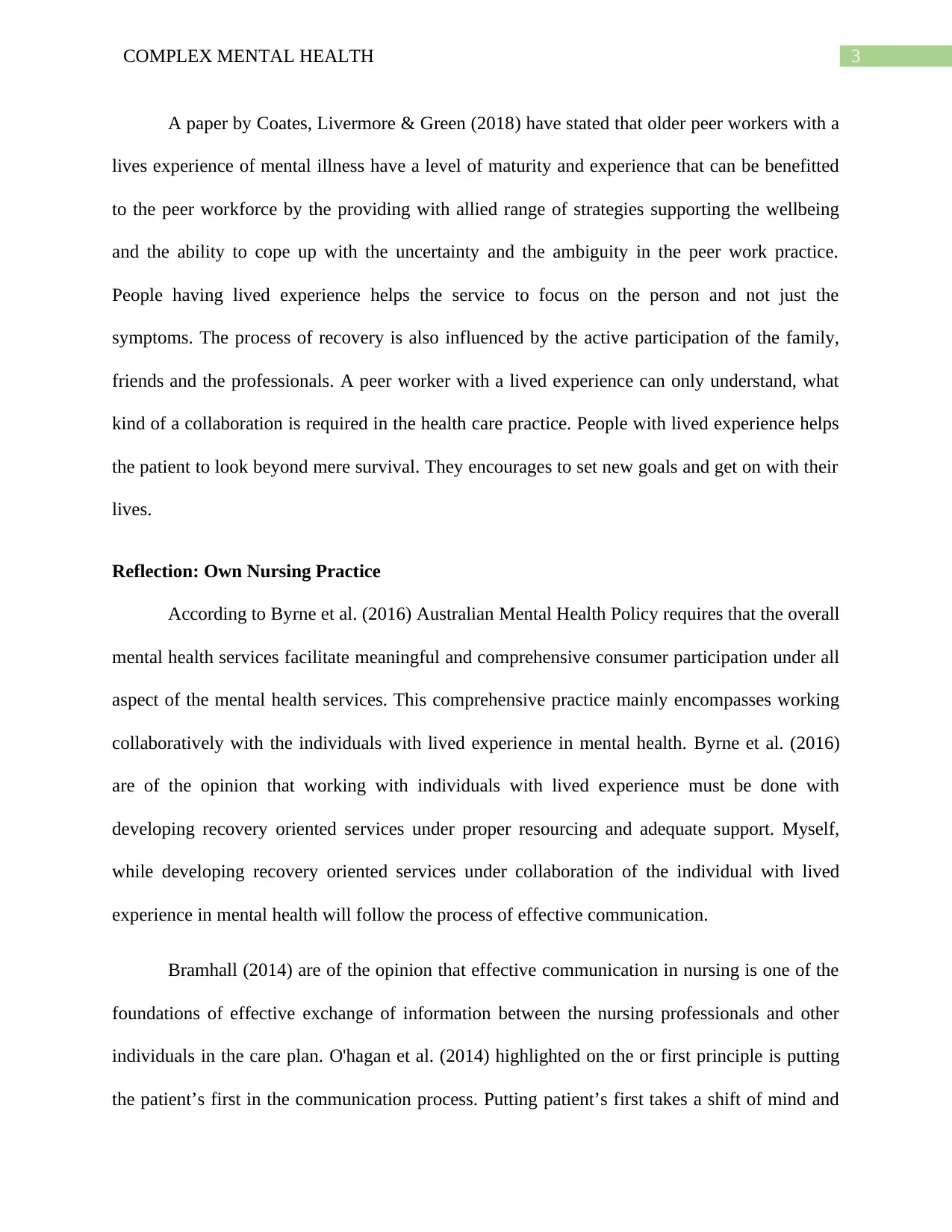
3COMPLEX MENTAL HEALTH
A paper by Coates, Livermore & Green (2018) have stated that older peer workers with a
lives experience of mental illness have a level of maturity and experience that can be benefitted
to the peer workforce by the providing with allied range of strategies supporting the wellbeing
and the ability to cope up with the uncertainty and the ambiguity in the peer work practice.
People having lived experience helps the service to focus on the person and not just the
symptoms. The process of recovery is also influenced by the active participation of the family,
friends and the professionals. A peer worker with a lived experience can only understand, what
kind of a collaboration is required in the health care practice. People with lived experience helps
the patient to look beyond mere survival. They encourages to set new goals and get on with their
lives.
Reflection: Own Nursing Practice
According to Byrne et al. (2016) Australian Mental Health Policy requires that the overall
mental health services facilitate meaningful and comprehensive consumer participation under all
aspect of the mental health services. This comprehensive practice mainly encompasses working
collaboratively with the individuals with lived experience in mental health. Byrne et al. (2016)
are of the opinion that working with individuals with lived experience must be done with
developing recovery oriented services under proper resourcing and adequate support. Myself,
while developing recovery oriented services under collaboration of the individual with lived
experience in mental health will follow the process of effective communication.
Bramhall (2014) are of the opinion that effective communication in nursing is one of the
foundations of effective exchange of information between the nursing professionals and other
individuals in the care plan. O'hagan et al. (2014) highlighted on the or first principle is putting
the patient’s first in the communication process. Putting patient’s first takes a shift of mind and
A paper by Coates, Livermore & Green (2018) have stated that older peer workers with a
lives experience of mental illness have a level of maturity and experience that can be benefitted
to the peer workforce by the providing with allied range of strategies supporting the wellbeing
and the ability to cope up with the uncertainty and the ambiguity in the peer work practice.
People having lived experience helps the service to focus on the person and not just the
symptoms. The process of recovery is also influenced by the active participation of the family,
friends and the professionals. A peer worker with a lived experience can only understand, what
kind of a collaboration is required in the health care practice. People with lived experience helps
the patient to look beyond mere survival. They encourages to set new goals and get on with their
lives.
Reflection: Own Nursing Practice
According to Byrne et al. (2016) Australian Mental Health Policy requires that the overall
mental health services facilitate meaningful and comprehensive consumer participation under all
aspect of the mental health services. This comprehensive practice mainly encompasses working
collaboratively with the individuals with lived experience in mental health. Byrne et al. (2016)
are of the opinion that working with individuals with lived experience must be done with
developing recovery oriented services under proper resourcing and adequate support. Myself,
while developing recovery oriented services under collaboration of the individual with lived
experience in mental health will follow the process of effective communication.
Bramhall (2014) are of the opinion that effective communication in nursing is one of the
foundations of effective exchange of information between the nursing professionals and other
individuals in the care plan. O'hagan et al. (2014) highlighted on the or first principle is putting
the patient’s first in the communication process. Putting patient’s first takes a shift of mind and
Paraphrase This Document
Need a fresh take? Get an instant paraphrase of this document with our AI Paraphraser
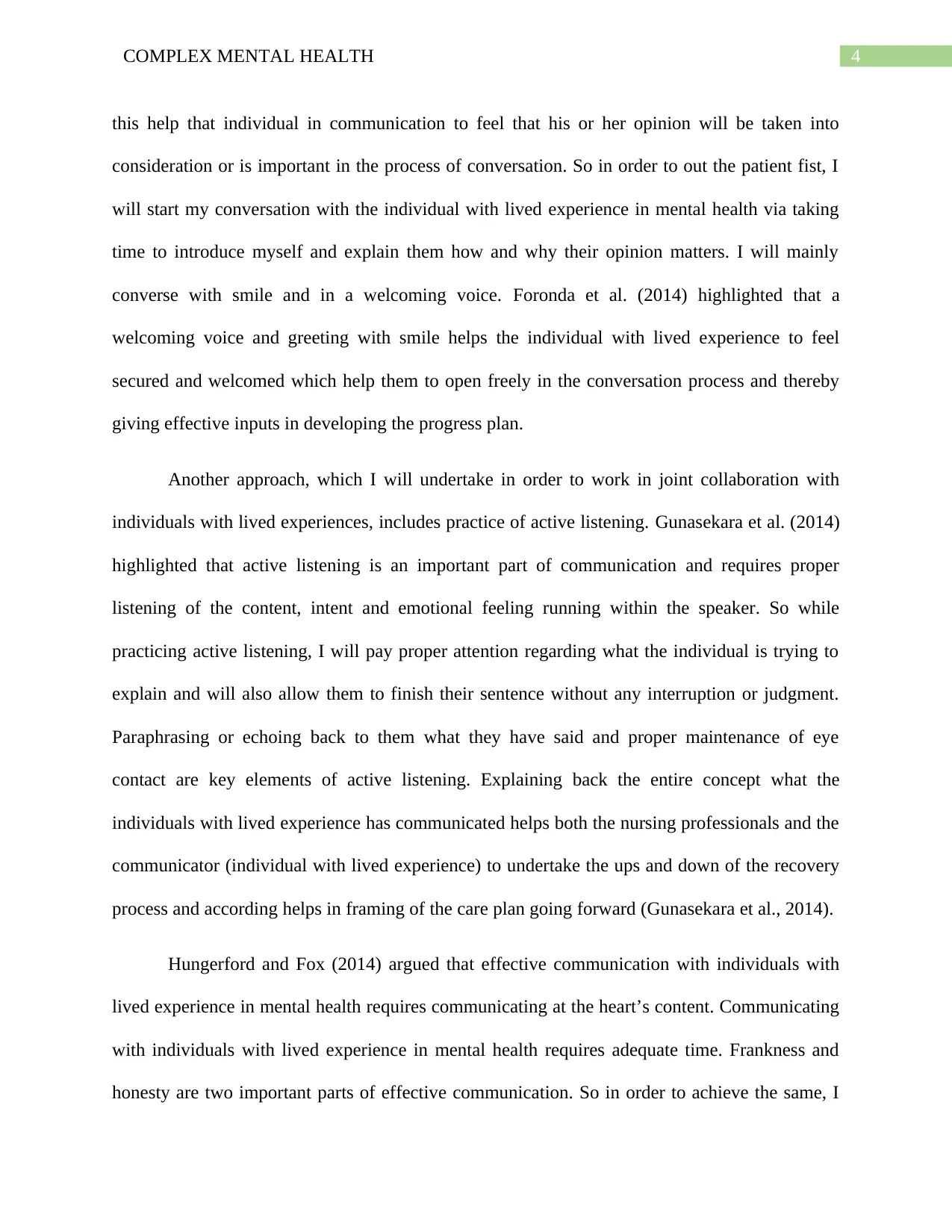
4COMPLEX MENTAL HEALTH
this help that individual in communication to feel that his or her opinion will be taken into
consideration or is important in the process of conversation. So in order to out the patient fist, I
will start my conversation with the individual with lived experience in mental health via taking
time to introduce myself and explain them how and why their opinion matters. I will mainly
converse with smile and in a welcoming voice. Foronda et al. (2014) highlighted that a
welcoming voice and greeting with smile helps the individual with lived experience to feel
secured and welcomed which help them to open freely in the conversation process and thereby
giving effective inputs in developing the progress plan.
Another approach, which I will undertake in order to work in joint collaboration with
individuals with lived experiences, includes practice of active listening. Gunasekara et al. (2014)
highlighted that active listening is an important part of communication and requires proper
listening of the content, intent and emotional feeling running within the speaker. So while
practicing active listening, I will pay proper attention regarding what the individual is trying to
explain and will also allow them to finish their sentence without any interruption or judgment.
Paraphrasing or echoing back to them what they have said and proper maintenance of eye
contact are key elements of active listening. Explaining back the entire concept what the
individuals with lived experience has communicated helps both the nursing professionals and the
communicator (individual with lived experience) to undertake the ups and down of the recovery
process and according helps in framing of the care plan going forward (Gunasekara et al., 2014).
Hungerford and Fox (2014) argued that effective communication with individuals with
lived experience in mental health requires communicating at the heart’s content. Communicating
with individuals with lived experience in mental health requires adequate time. Frankness and
honesty are two important parts of effective communication. So in order to achieve the same, I
this help that individual in communication to feel that his or her opinion will be taken into
consideration or is important in the process of conversation. So in order to out the patient fist, I
will start my conversation with the individual with lived experience in mental health via taking
time to introduce myself and explain them how and why their opinion matters. I will mainly
converse with smile and in a welcoming voice. Foronda et al. (2014) highlighted that a
welcoming voice and greeting with smile helps the individual with lived experience to feel
secured and welcomed which help them to open freely in the conversation process and thereby
giving effective inputs in developing the progress plan.
Another approach, which I will undertake in order to work in joint collaboration with
individuals with lived experiences, includes practice of active listening. Gunasekara et al. (2014)
highlighted that active listening is an important part of communication and requires proper
listening of the content, intent and emotional feeling running within the speaker. So while
practicing active listening, I will pay proper attention regarding what the individual is trying to
explain and will also allow them to finish their sentence without any interruption or judgment.
Paraphrasing or echoing back to them what they have said and proper maintenance of eye
contact are key elements of active listening. Explaining back the entire concept what the
individuals with lived experience has communicated helps both the nursing professionals and the
communicator (individual with lived experience) to undertake the ups and down of the recovery
process and according helps in framing of the care plan going forward (Gunasekara et al., 2014).
Hungerford and Fox (2014) argued that effective communication with individuals with
lived experience in mental health requires communicating at the heart’s content. Communicating
with individuals with lived experience in mental health requires adequate time. Frankness and
honesty are two important parts of effective communication. So in order to achieve the same, I
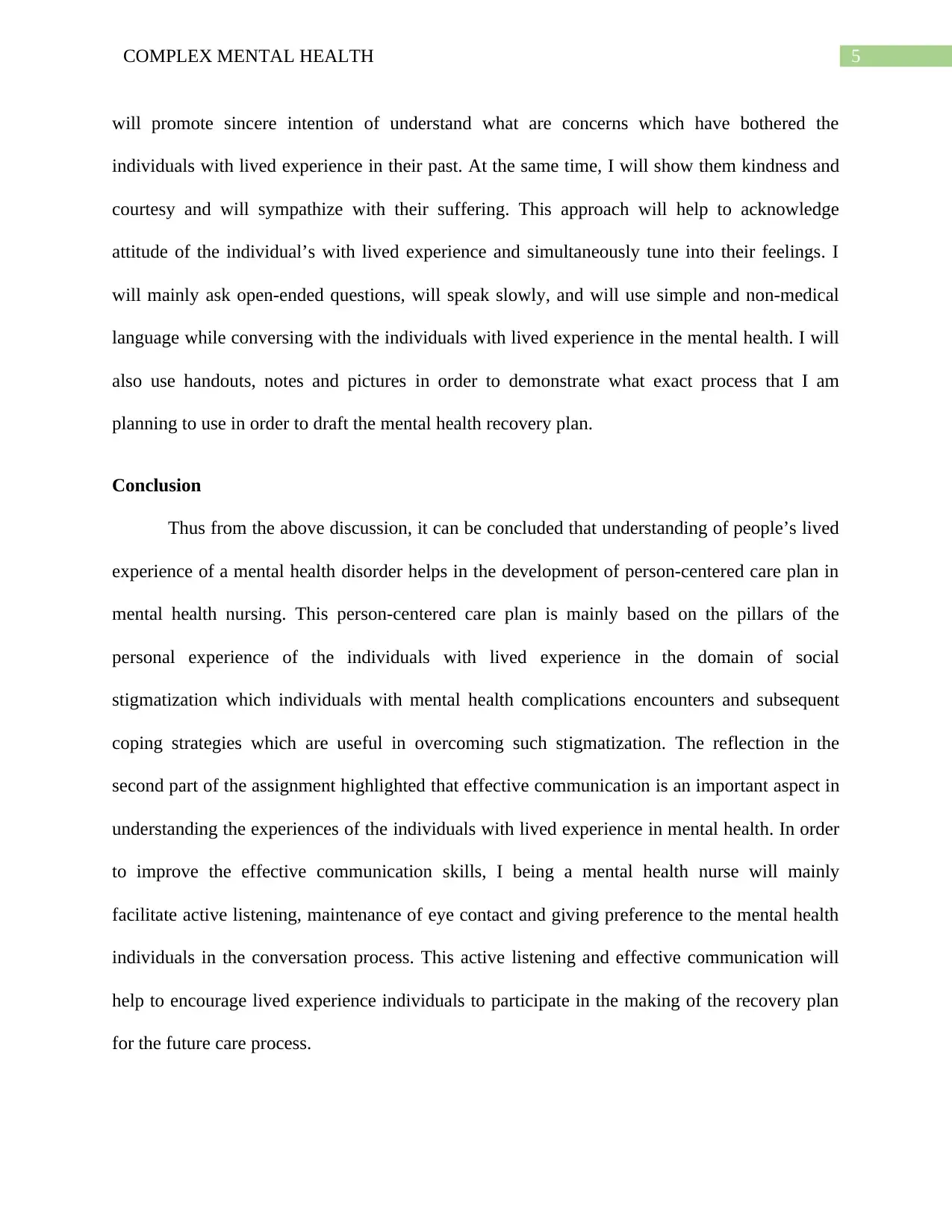
5COMPLEX MENTAL HEALTH
will promote sincere intention of understand what are concerns which have bothered the
individuals with lived experience in their past. At the same time, I will show them kindness and
courtesy and will sympathize with their suffering. This approach will help to acknowledge
attitude of the individual’s with lived experience and simultaneously tune into their feelings. I
will mainly ask open-ended questions, will speak slowly, and will use simple and non-medical
language while conversing with the individuals with lived experience in the mental health. I will
also use handouts, notes and pictures in order to demonstrate what exact process that I am
planning to use in order to draft the mental health recovery plan.
Conclusion
Thus from the above discussion, it can be concluded that understanding of people’s lived
experience of a mental health disorder helps in the development of person-centered care plan in
mental health nursing. This person-centered care plan is mainly based on the pillars of the
personal experience of the individuals with lived experience in the domain of social
stigmatization which individuals with mental health complications encounters and subsequent
coping strategies which are useful in overcoming such stigmatization. The reflection in the
second part of the assignment highlighted that effective communication is an important aspect in
understanding the experiences of the individuals with lived experience in mental health. In order
to improve the effective communication skills, I being a mental health nurse will mainly
facilitate active listening, maintenance of eye contact and giving preference to the mental health
individuals in the conversation process. This active listening and effective communication will
help to encourage lived experience individuals to participate in the making of the recovery plan
for the future care process.
will promote sincere intention of understand what are concerns which have bothered the
individuals with lived experience in their past. At the same time, I will show them kindness and
courtesy and will sympathize with their suffering. This approach will help to acknowledge
attitude of the individual’s with lived experience and simultaneously tune into their feelings. I
will mainly ask open-ended questions, will speak slowly, and will use simple and non-medical
language while conversing with the individuals with lived experience in the mental health. I will
also use handouts, notes and pictures in order to demonstrate what exact process that I am
planning to use in order to draft the mental health recovery plan.
Conclusion
Thus from the above discussion, it can be concluded that understanding of people’s lived
experience of a mental health disorder helps in the development of person-centered care plan in
mental health nursing. This person-centered care plan is mainly based on the pillars of the
personal experience of the individuals with lived experience in the domain of social
stigmatization which individuals with mental health complications encounters and subsequent
coping strategies which are useful in overcoming such stigmatization. The reflection in the
second part of the assignment highlighted that effective communication is an important aspect in
understanding the experiences of the individuals with lived experience in mental health. In order
to improve the effective communication skills, I being a mental health nurse will mainly
facilitate active listening, maintenance of eye contact and giving preference to the mental health
individuals in the conversation process. This active listening and effective communication will
help to encourage lived experience individuals to participate in the making of the recovery plan
for the future care process.
⊘ This is a preview!⊘
Do you want full access?
Subscribe today to unlock all pages.

Trusted by 1+ million students worldwide
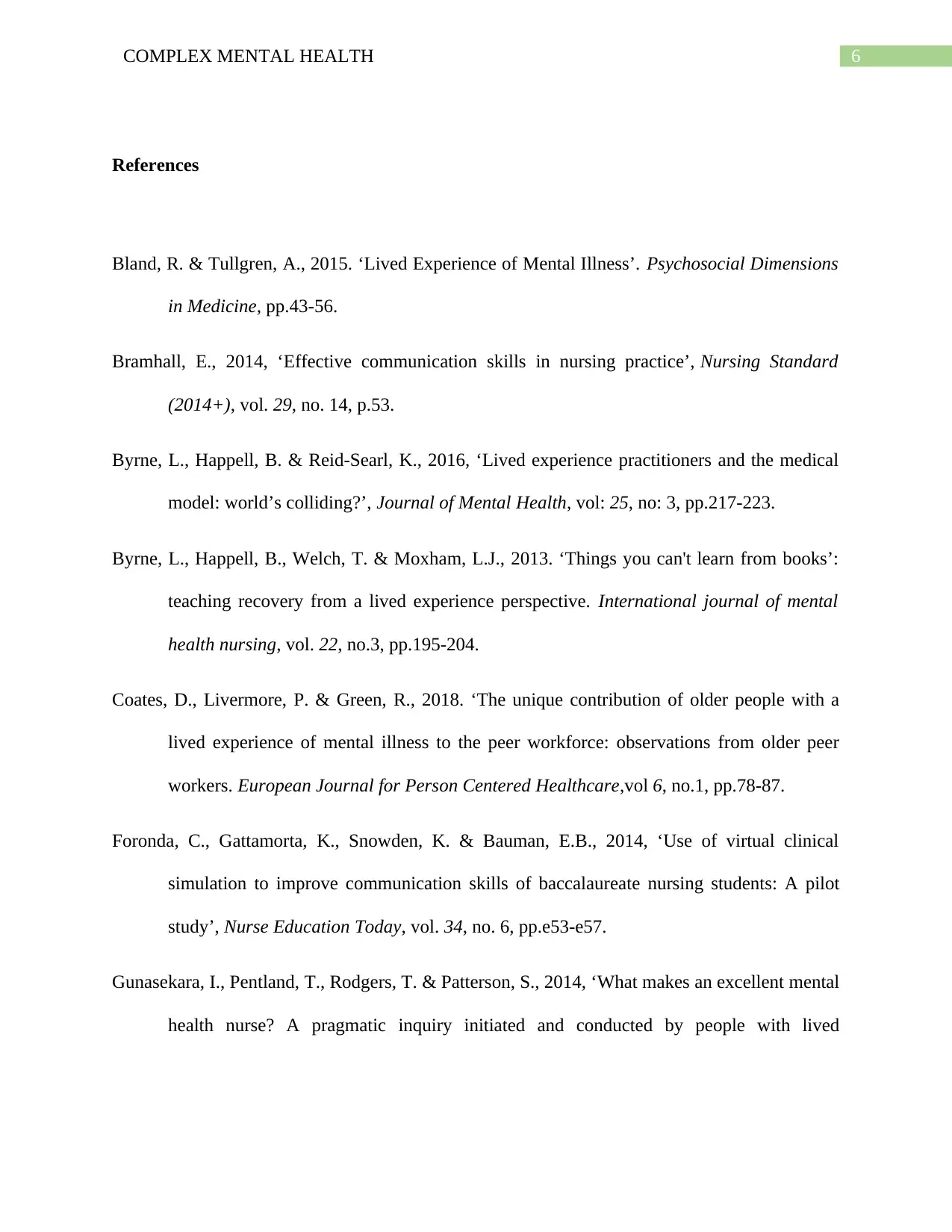
6COMPLEX MENTAL HEALTH
References
Bland, R. & Tullgren, A., 2015. ‘Lived Experience of Mental Illness’. Psychosocial Dimensions
in Medicine, pp.43-56.
Bramhall, E., 2014, ‘Effective communication skills in nursing practice’, Nursing Standard
(2014+), vol. 29, no. 14, p.53.
Byrne, L., Happell, B. & Reid-Searl, K., 2016, ‘Lived experience practitioners and the medical
model: world’s colliding?’, Journal of Mental Health, vol: 25, no: 3, pp.217-223.
Byrne, L., Happell, B., Welch, T. & Moxham, L.J., 2013. ‘Things you can't learn from books’:
teaching recovery from a lived experience perspective. International journal of mental
health nursing, vol. 22, no.3, pp.195-204.
Coates, D., Livermore, P. & Green, R., 2018. ‘The unique contribution of older people with a
lived experience of mental illness to the peer workforce: observations from older peer
workers. European Journal for Person Centered Healthcare,vol 6, no.1, pp.78-87.
Foronda, C., Gattamorta, K., Snowden, K. & Bauman, E.B., 2014, ‘Use of virtual clinical
simulation to improve communication skills of baccalaureate nursing students: A pilot
study’, Nurse Education Today, vol. 34, no. 6, pp.e53-e57.
Gunasekara, I., Pentland, T., Rodgers, T. & Patterson, S., 2014, ‘What makes an excellent mental
health nurse? A pragmatic inquiry initiated and conducted by people with lived
References
Bland, R. & Tullgren, A., 2015. ‘Lived Experience of Mental Illness’. Psychosocial Dimensions
in Medicine, pp.43-56.
Bramhall, E., 2014, ‘Effective communication skills in nursing practice’, Nursing Standard
(2014+), vol. 29, no. 14, p.53.
Byrne, L., Happell, B. & Reid-Searl, K., 2016, ‘Lived experience practitioners and the medical
model: world’s colliding?’, Journal of Mental Health, vol: 25, no: 3, pp.217-223.
Byrne, L., Happell, B., Welch, T. & Moxham, L.J., 2013. ‘Things you can't learn from books’:
teaching recovery from a lived experience perspective. International journal of mental
health nursing, vol. 22, no.3, pp.195-204.
Coates, D., Livermore, P. & Green, R., 2018. ‘The unique contribution of older people with a
lived experience of mental illness to the peer workforce: observations from older peer
workers. European Journal for Person Centered Healthcare,vol 6, no.1, pp.78-87.
Foronda, C., Gattamorta, K., Snowden, K. & Bauman, E.B., 2014, ‘Use of virtual clinical
simulation to improve communication skills of baccalaureate nursing students: A pilot
study’, Nurse Education Today, vol. 34, no. 6, pp.e53-e57.
Gunasekara, I., Pentland, T., Rodgers, T. & Patterson, S., 2014, ‘What makes an excellent mental
health nurse? A pragmatic inquiry initiated and conducted by people with lived
Paraphrase This Document
Need a fresh take? Get an instant paraphrase of this document with our AI Paraphraser
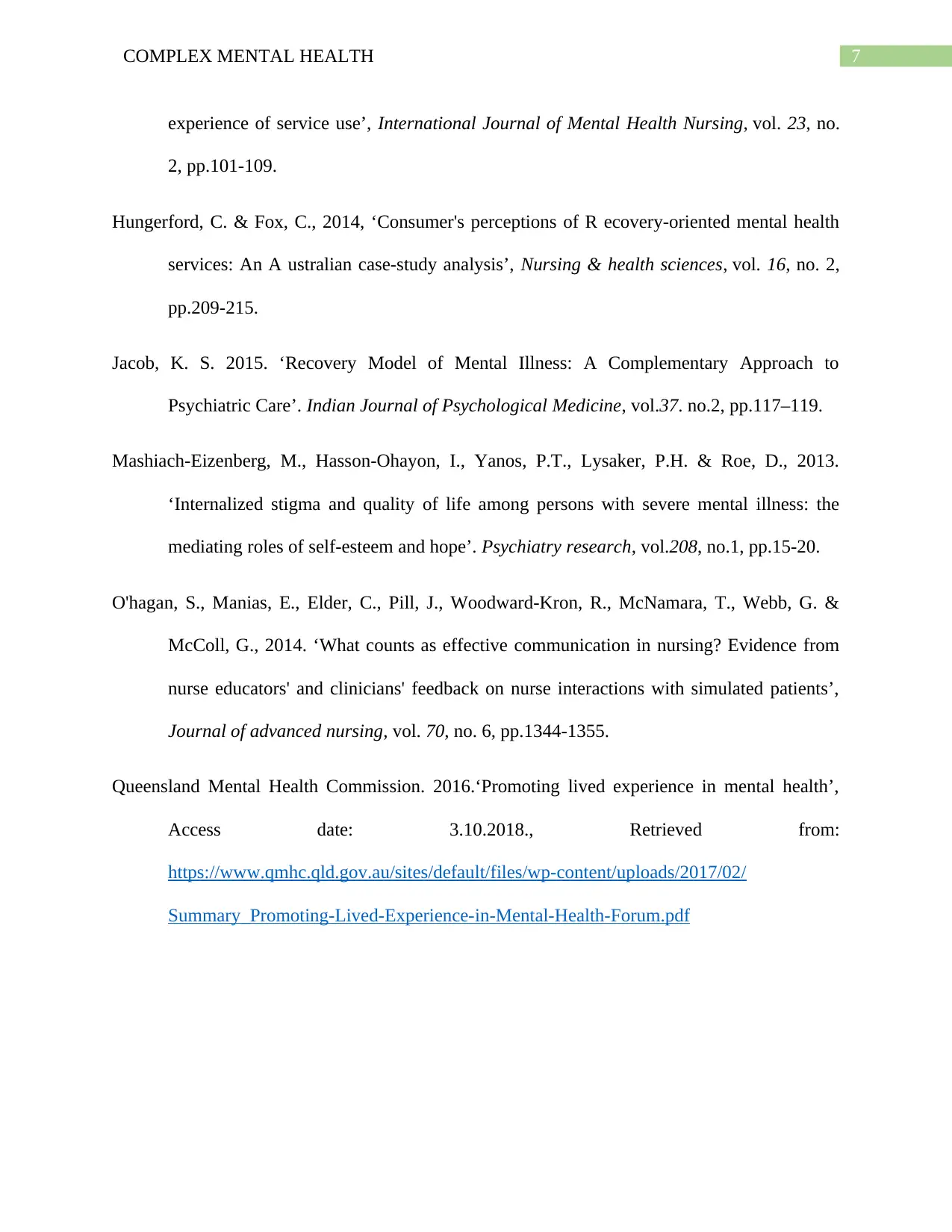
7COMPLEX MENTAL HEALTH
experience of service use’, International Journal of Mental Health Nursing, vol. 23, no.
2, pp.101-109.
Hungerford, C. & Fox, C., 2014, ‘Consumer's perceptions of R ecovery‐oriented mental health
services: An A ustralian case‐study analysis’, Nursing & health sciences, vol. 16, no. 2,
pp.209-215.
Jacob, K. S. 2015. ‘Recovery Model of Mental Illness: A Complementary Approach to
Psychiatric Care’. Indian Journal of Psychological Medicine, vol.37. no.2, pp.117–119.
Mashiach-Eizenberg, M., Hasson-Ohayon, I., Yanos, P.T., Lysaker, P.H. & Roe, D., 2013.
‘Internalized stigma and quality of life among persons with severe mental illness: the
mediating roles of self-esteem and hope’. Psychiatry research, vol.208, no.1, pp.15-20.
O'hagan, S., Manias, E., Elder, C., Pill, J., Woodward‐Kron, R., McNamara, T., Webb, G. &
McColl, G., 2014. ‘What counts as effective communication in nursing? Evidence from
nurse educators' and clinicians' feedback on nurse interactions with simulated patients’,
Journal of advanced nursing, vol. 70, no. 6, pp.1344-1355.
Queensland Mental Health Commission. 2016.‘Promoting lived experience in mental health’,
Access date: 3.10.2018., Retrieved from:
https://www.qmhc.qld.gov.au/sites/default/files/wp-content/uploads/2017/02/
Summary_Promoting-Lived-Experience-in-Mental-Health-Forum.pdf
experience of service use’, International Journal of Mental Health Nursing, vol. 23, no.
2, pp.101-109.
Hungerford, C. & Fox, C., 2014, ‘Consumer's perceptions of R ecovery‐oriented mental health
services: An A ustralian case‐study analysis’, Nursing & health sciences, vol. 16, no. 2,
pp.209-215.
Jacob, K. S. 2015. ‘Recovery Model of Mental Illness: A Complementary Approach to
Psychiatric Care’. Indian Journal of Psychological Medicine, vol.37. no.2, pp.117–119.
Mashiach-Eizenberg, M., Hasson-Ohayon, I., Yanos, P.T., Lysaker, P.H. & Roe, D., 2013.
‘Internalized stigma and quality of life among persons with severe mental illness: the
mediating roles of self-esteem and hope’. Psychiatry research, vol.208, no.1, pp.15-20.
O'hagan, S., Manias, E., Elder, C., Pill, J., Woodward‐Kron, R., McNamara, T., Webb, G. &
McColl, G., 2014. ‘What counts as effective communication in nursing? Evidence from
nurse educators' and clinicians' feedback on nurse interactions with simulated patients’,
Journal of advanced nursing, vol. 70, no. 6, pp.1344-1355.
Queensland Mental Health Commission. 2016.‘Promoting lived experience in mental health’,
Access date: 3.10.2018., Retrieved from:
https://www.qmhc.qld.gov.au/sites/default/files/wp-content/uploads/2017/02/
Summary_Promoting-Lived-Experience-in-Mental-Health-Forum.pdf
1 out of 8
Related Documents
Your All-in-One AI-Powered Toolkit for Academic Success.
+13062052269
info@desklib.com
Available 24*7 on WhatsApp / Email
![[object Object]](/_next/static/media/star-bottom.7253800d.svg)
Unlock your academic potential
Copyright © 2020–2025 A2Z Services. All Rights Reserved. Developed and managed by ZUCOL.





